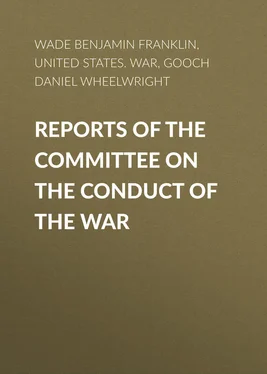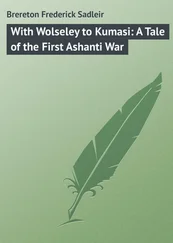Benjamin Wade - Reports of the Committee on the Conduct of the War
Здесь есть возможность читать онлайн «Benjamin Wade - Reports of the Committee on the Conduct of the War» — ознакомительный отрывок электронной книги совершенно бесплатно, а после прочтения отрывка купить полную версию. В некоторых случаях можно слушать аудио, скачать через торрент в формате fb2 и присутствует краткое содержание. Жанр: История, foreign_antique, foreign_prose, на английском языке. Описание произведения, (предисловие) а так же отзывы посетителей доступны на портале библиотеки ЛибКат.
- Название:Reports of the Committee on the Conduct of the War
- Автор:
- Жанр:
- Год:неизвестен
- ISBN:нет данных
- Рейтинг книги:3 / 5. Голосов: 1
-
Избранное:Добавить в избранное
- Отзывы:
-
Ваша оценка:
- 60
- 1
- 2
- 3
- 4
- 5
Reports of the Committee on the Conduct of the War: краткое содержание, описание и аннотация
Предлагаем к чтению аннотацию, описание, краткое содержание или предисловие (зависит от того, что написал сам автор книги «Reports of the Committee on the Conduct of the War»). Если вы не нашли необходимую информацию о книге — напишите в комментариях, мы постараемся отыскать её.
Reports of the Committee on the Conduct of the War — читать онлайн ознакомительный отрывок
Ниже представлен текст книги, разбитый по страницам. Система сохранения места последней прочитанной страницы, позволяет с удобством читать онлайн бесплатно книгу «Reports of the Committee on the Conduct of the War», без необходимости каждый раз заново искать на чём Вы остановились. Поставьте закладку, и сможете в любой момент перейти на страницу, на которой закончили чтение.
Интервал:
Закладка:
Question. What happened to you then?
Answer. I laid down, and a fellow came along and turned me over and searched my pockets and took my money. He said: "God damn his old soul; he is sure dead now; he is a big, old, fat fellow."
Question. How long did you lay there?
Answer. About two hours.
Question. Then what was done with you?
Answer. They made some of our men carry me up the hill to a house that was full of white men. They made us lie out doors all night, and said that the next morning they would have the doctor fix us up. I went down to a branch for some water, and a man said to me: "Old man, if you stay here they will kill you, but if you get into the water till the boat comes along they may save you;" and I went off. They shot a great many that evening.
Question. The day of the fight?
Answer. Yes, sir. I heard them shoot little children not more than that high, [holding his hand off about four feet from the floor,] that the officers had to wait upon them.
Question. Did you see them shoot them?
Answer. I did not hold up my head.
Question. How did you know that they shot them then?
Answer. I heard them say, "Turn around so that I can shoot you good;" and then I heard them fire, and then I heard the children fall over.
Question. Do you know that those were the boys that waited upon the officers?
Answer. Yes, sir; one was named Dave, and the other was named Anderson.
Question. Did you see them after they were shot?
Answer. No, sir; they toted them up the hill before me, because they were small. I never saw folks shot down so in my life.
By Mr. Gooch:
Question. Do you know of anybody being buried alive?
Answer. No, sir.
Question. Do you know of any one being burned?
Answer. They had a whole parcel of them in a house, and I think they burned them. The house was burned up, and I think they burned them in it.
Question. Were the men in the house colored men?
Answer. No, sir. The rebels never would have got the advantage of us if it had not been for the houses built there, and which made better breastworks for them than we had. The major would not let us burn the houses in the morning. If they had let us burn the houses in the morning, I do not believe they would ever have whipped us out of that place.
Manuel Nichols, (colored,) private, Company B, 6th United States heavy artillery, sworn and examined.
By Mr. Gooch:
Question. Were you in the late fight at Fort Pillow?
Answer. Yes, sir.
Question. Were you wounded there?
Answer. Yes, sir.
Question. When?
Answer. I was wounded once about a half an hour before we gave up.
Question. Did they do anything to you after you surrendered?
Answer. Yes, sir; they shot me in the head under my left ear, and the morning after the fight they shot me again in the right arm. When they came up and killed the wounded ones, I saw some four or five coming down the hill. I said to one of our boys, "Anderson, I expect if those fellows come here they will kill us." I was lying on my right side, leaning on my elbow. One of the black soldiers went into the house where the white soldiers were. I asked him if there was any water in there, and he said yes; I wanted some, and took a stick and tried to get to the house. I did not get to the house. Some of them came along, and saw a little boy belonging to company D. One of them had his musket on his shoulder, and shot the boy down. He said: "All you damned niggers come out of the house; I am going to shoot you." Some of the white soldiers said, "Boys, it is only death anyhow; if you don't go out they will come in and carry you out." My strength seemed to come to me as if I had never been shot, and I jumped up and ran down the hill. I met one of them coming up the hill; he said "stop!" but I kept on running. As I jumped over the hill, he shot me through the right arm.
Question. How many did you see them kill after they had surrendered?
Answer. After I surrendered I did not go down the hill. A man shot me under the ear, and I fell down and said to myself, "If he don't shoot me any more this won't hurt me." One of their officers came along and hallooed, "Forrest says, no quarter! no quarter!" and the next one hallooed, "Black flag! black flag!"
Question. What did they do then?
Answer. They kept on shouting. I could hear them down the hill.
Question. Did you see them bury anybody?
Answer. Yes, sir; they carried me around right to the corner of the fort, and I saw them pitch men in there.
Question. Was there any alive?
Answer. I did not see them bury anybody alive.
Question. How near to you was the man who shot you under the ear?
Answer. Right close to my head. When I was shot in the side, a man turned me over, and took my pocket-knife and pocket-book. I had some of these brass things that looked like cents. They said, "Here's some money; here's some money." I said to myself, "You got fooled that time."
Arthur Edwards, (colored,) private, company C, 6th United States heavy artillery, sworn and examined.
By the chairman:
Question. Where were you raised?
Answer. In Mississippi.
Question. Were you in Fort Pillow when it was taken?
Answer. Yes, sir.
Question. Tell what you saw there.
Answer. I was shot after I surrendered.
Question. When?
Answer. About half past four o'clock.
Question. Where were you when you were shot?
Answer. I was lying down behind a log.
Question. Where were you shot?
Answer. In the head first, then in the shoulder, then in my right wrist; and then in the head again, about half an hour after that.
Question. How many men shot at you?
Answer. One shot at me three times, and then a lieutenant shot at me.
Question. Did they say anything when they shot you?
Answer. No, sir, only I asked them not to shoot me, and they said, "God damn you, you are fighting against your master."
Question. How near was the man to you when he shot you?
Answer. He squatted down, and held his pistol close to my head.
Question. How near was the officer to you when he shot you?
Answer. About five or ten feet off; he was sitting on his horse.
Question. Who said you were fighting against your master?
Answer. The man that shot me.
Question. What did the officer say?
Answer. Nothing, but "you God damned nigger." A captain told him not to do it, but he did not mind him; he shot me, and run off on his horse.
Question. Did you see the captain?
Answer. Yes, sir; he and the captain were side by side.
Question. Did you know the captain?
Answer. No, sir.
Question. How long did you stay there?
Answer. Until next morning about 9 o'clock.
Question. How did you get away?
Answer. When the gunboat commenced shelling I went down the hill, and staid there until they carried down a flag of truce. Then the gunboat came to the bank, and a secesh lieutenant made us go down to such a place, and told us to go no further, or we would get shot again. Then the gunboat men came along to bury the dead, and told us to go on the boat.
Question. Did you see anybody shot after they had surrendered, besides yourself?
Answer. Yes, sir; they shot one right by me, and lots of the 13th Tennessee cavalry.
Question. After they had surrendered?
Answer. Yes, sir.
Question. Do you know whether any were buried alive?
Answer. Not that I saw.
Question. Did you see anybody buried?
Answer. No, sir.
Question. Did you see anybody shot the day after the fight?
Answer. No, sir.
Charles Key, (colored,) private, company D, 6th United States heavy artillery, sworn and examined.
By Mr. Gooch:
Question. Where were you raised?
Answer. In South Carolina.
Читать дальшеИнтервал:
Закладка:
Похожие книги на «Reports of the Committee on the Conduct of the War»
Представляем Вашему вниманию похожие книги на «Reports of the Committee on the Conduct of the War» списком для выбора. Мы отобрали схожую по названию и смыслу литературу в надежде предоставить читателям больше вариантов отыскать новые, интересные, ещё непрочитанные произведения.
Обсуждение, отзывы о книге «Reports of the Committee on the Conduct of the War» и просто собственные мнения читателей. Оставьте ваши комментарии, напишите, что Вы думаете о произведении, его смысле или главных героях. Укажите что конкретно понравилось, а что нет, и почему Вы так считаете.












